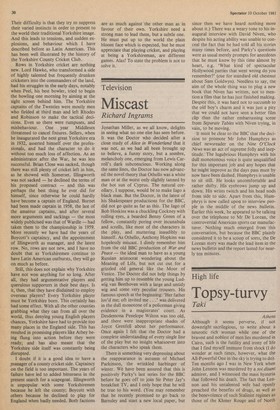Television
Miscast
Richard Ingrams
Jonathan Miller, as we all know, delights in seeing what no one else has seen before. It was the Doctor who decided after a close study of Alice in Wonderland that it was not, as we had all been brought up to believe, a funny story, but a sombre, melancholy one, emerging from Lewis Carroll's dark subconscious. Working along the same lines, the Doctor has now advanced the novel theory that Othello was a white man or at the worst only slightly tanned by the hot sun of Cyprus. The natural corollary, I suppose, would be to make lago a black man. But the Doctor, in the latest of his Shakespeare productions for the BBC, did not go quite as far as this. The Iago of Bob Hoskins was a chuckling Cockney with rolling eyes, a bearded Benny Green of a fellow, constantly poring over incunabula and scrolls, like most of the characters in the play, and muttering inaudibly to himself. As Othello, Anthony Hopkins was hopelessly miscast. I dimly remember him from the old BBC production of War and Peace — the ideal man to have as a young Russian aristocrat wondering about the Meaning of Life, but not cut out for a grizzled old general like the Moor of Venice. The Doctor did not help things by getting him up to resemble the young Ludwig van Beethoven with a large and untidy wig and some very peculiar trousers. His famous speech at the beginning: 'Her father lov'd me; oft invited me . . .' was delivered in the dull monotone of a policeman giving evidence in a magistrates' court. As Desdemona Penelope Wilton was too old, and there were inappropriate shades of Joyce Grenfell about her performance. Once again I felt that the Doctor had a complete understanding of every single line of the play but no insight whatsoever into the characters who speak them.
There is something very depressing about the reappearance in autumn of Michael Parkinson, the wrinkled harbinger of winter. We have been assured that this is positively Parky's last series for the BBC before he goes off to join Sir Peter Jay's breakfast TV, and I only hope that he will be true to his word. (You may remember that he recently promised to go back to Barnsley and start a new local paper, but since then we have heard nothing more about it.) There was a weary tone to his inaugural interview with David Niven, who despite his acting ability was unable to conceal the fact that he had told all his stories many times before, and Parky's questions were as usual merely prompts for anecdotes that he must know by this time almost by heart, e.g. 'What kind of spectacular Hollywood parties that went wrong do you remember?' (cue for standard old chestnut about Sam Goldwyn). Needless to say, the aim of the whole thing was to plug a new book that Niven has written, not to mention a film that he has just finished making. Despite this, it was hard not to succumb to the old boy's charm and it was just a pity that we could not have seen a better film clip than the rather embarrassing scene from Separate Tables with Niven trying, in vain, to be moving.
It must be clear to the BBC that the decision to promote Mr John Humphrys as chief newsreader on the Nine O'Clock News was an act of supreme folly and ineptitude. The lugubrious Humphrys with his dull monotonous voice is quite unqualified for this important job and any hopes that he might improve as the days pass must by now have been dashed. Humphrys is unable to sit still. He looks uncomfortable and rather shifty. His eyebrows jump up and down. His wrists twitch and his head nods from side to side. Apart from this, Humphrys is now called upon to interview people in the middle of the news bulletin. Earlier this week, he appeared to be talking over the telephone to Mr De Lorean, the controversial American sports car manufacturer. Nothing much emerged from this conversation, but because the BBC plainly considered it to be a scoop of sorts, the De Lorean story was made the lead item in the news bulletin and the report lasted for nearly ten minutes.






































 Previous page
Previous page